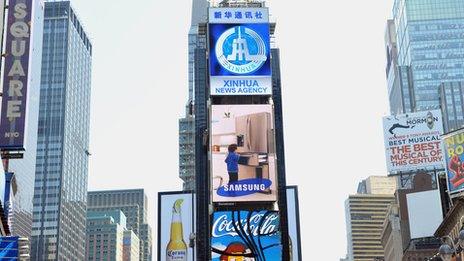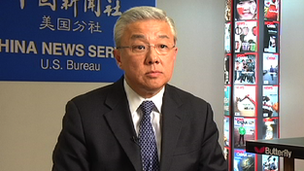Chinese media push into US
- Published

Xinhua's billboard now shines out above other more conventional advertisements
China is aggressively trying to stake out a place in America's highly competitive media landscape in an effort to get the country presented in a more positive light.
Through state-owned television, newspapers, magazines and online sites, China is trying to reach millions of Americans with its own brand of news.
One of the more visible signs of the growing Chinese media presence in the US can be found right in the heart of New York, where Xinhua, China's state-run news agency, has paid for a huge electronic billboard to display its logo from one of the tallest buildings in Times Square.
Down below, on the streets, most New Yorkers have no clue what the billboard represents, but Elizabeth Economy, director of Asia Studies at the Council on Foreign Relations, detects a growing trend.
"I think there's been an explosion in the role that Chinese media have tried to play over the past two to three years. I think they're really making a play to get the Chinese voice into the American media mainstream," she says.
Journalism or propaganda?
Nowadays, Americans can find copies of China Daily appearing as advertising supplements within established papers like the New York Times and Washington Post.

Ms Economy believes that Chinese media is trying to make its voice heard in the US
There is a strengthened Chinese news presence online - and this year, China launched a cable network for Americans called CCTV America.
"The Chinese government for many, many years has felt as though the narrative on China has been dominated by a Western perspective," Ms Economy says.
"And the Chinese believe the time is now for China to get its own voice out there and tell its own story."
With the growth of China's state-owned media in the US, there is a lot of information to be sifted, sorted and digested.
China's news organisations cover a broad range of international, American and Chinese stories. But what is it that is being delivered - is it journalism or is it propaganda - especially when it comes to China?
Sarah Cook, Asia research analyst at the pro-democracy organisation Freedom House, which monitors press freedom, has no doubt that it is propaganda that is being peddled.
Whether its China Daily, Xinhua News, or CCTV, she says: "Most of what's reported is going to have to fit within a certain scope of censorship directives that are regularly issued by the Chinese government.
"In some cases, it could be that you're just not allowed to write about anything. In other cases, it could be that you have to say something very specific about the facts of a particular incident, and other elements that might be complete fabrications of information," she adds.
Controversial remarks

Mr Teng thinks Chinese media abide by journalistic guidelines
The attempts by the Chinese media to be seen as independent in the US have not been helped by the comments made last year by CCTV President Hu Zhanfan.
He remarked: "The first social responsibility and professional ethic of media staff should be understanding their role clearly and being a good mouthpiece."
He reportedly went on to say: "Journalists who think of themselves as professionals, instead of as propaganda workers, are making a fundamental mistake about identity."
Despite such proclamations, China's news outlets targeting Americans have defenders in the US.
"I think they abide by journalistic guidelines and report their news according to their accuracy, timeliness, proximity and so forth," says Fred Teng, business manager of NewsChina magazine, linked to the state-owned China News Service.
When New York-based Mr Teng was asked if he thought the Chinese media were engaged in propaganda, he replied: "I think that Chinese media…it's a very new growing media. They certainly have more room for improvements."
Low impact

Analysts believe editorial autonomy is important for success of Chinese media in US
There have been strides forward in the way China packages and presents its news. But despite CCTV casting itself as a slick, Western-style TV news operation, and efforts to make China Daily competitive with US papers, many Americans still harbour suspicions of bias when it comes to the Chinese media.
That is partly why China's US-targeted news services have not yet been able to attract a significant audience.
"I don't think that they're going to win over any hearts and minds unless and until they begin to adopt a format that is more akin to what Americans have grown up with, which really is a challenging and investigative form of journalism," Ms Economy says.
"That is what attracts people."
Many analysts share the view that Chinese media outlets trying to reach American audiences would not gain respect, or commercial viability until they have editorial autonomy - and that would require a loosening of control by Chinese officialdom - which is not likely.
In fact, the authorities in Beijing are closely overseeing China's media operations in the US. It is part of a much wider global endeavour to sway opinion.
Three years ago, the Chinese government reportedly committed $6bn (£3.87bn) to an international media push aimed at getting the country presented in more favourable terms.
So far, the experience, in America at least, suggests it is a strategy that has not yet been able to make much of an impact.
- Published6 June 2012
- Published2 November 2010
- Published8 August 2011